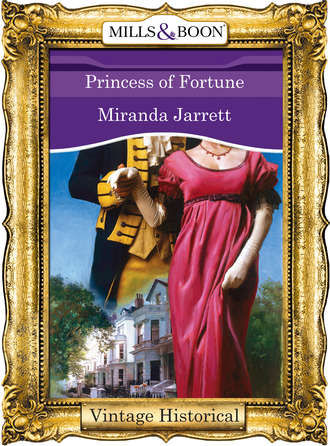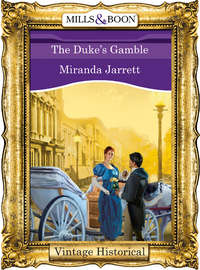
Полная версия
Princess of Fortune
“I told you to look away,” she said, wrinkling her nose and mouth at the sting of the cold water. “You are not being honorable.”
“Damnation, you have not given me the chance before you go and hike up your skirts!” he sputtered. She was wearing yellow lisle stockings with dark blue garters, the ribbons embroidered with red roses that, unfortunately, matched the scrapes on her knees—pale, plump knees which, scraped or not, were still quite fine to look upon. “What honorable lady would do such a thing, I ask you, let alone ask a gentleman to ignore it?”
She blinked, not at all embarrassed. “But I am not an honorable English lady, Tomaso. I am a princess, and I am entitled to ask whatever I please.”
He took a deep breath, making himself once again look at her face, an event that seemed to be happening far too frequently with her.
“Not that, ma’am,” he said as firmly as he could. “My orders regard your safety and well-being, not your—your modesty.”
“My modesty. How very English that sounds!” She grinned, and widened her eyes for emphasis. “Well, then. You have reasoned this better than any periwig judge. Since we are in England, I rescind my order. Look at my sad little knees if you wish, and I shall not protest.”
With a groan of frustration he dropped into the chair across from her, wondering if even one of those great admiralty lords had any idea of what he was going through.
“Why the devil aren’t you having one of the lady’s maids tend to you? What reason could you have for doing this here instead, except to plague me?”
“Because you are the only one who knows how it happened,” she said, dabbing at her knees. “I was impulsive and—and unwise. Stepping from a carriage without waiting for the step is something a simpleton would do, not a princess. The maidservants in this house whisper about me enough. They do not need to see that I have skinned my knees like a clumsy child. But you—I cannot have such a secret from you, can I?”
He hadn’t expected that. “You are fortunate you weren’t more badly hurt,” he said gruffly. “You could have broken your leg, or worse.”
“I’m fortunate in a great many ways, I suppose.” She dried her knees and flipped her skirts back down, smoothing them around her ankles for good measure. “I could also have been stabbed with a pair of embroidery scissors which, given my ineptitude at handwork, would have been most ironic.”
He frowned grimly. He supposed it was good that she could make light of it, but he could not. “‘Ironic’ isn’t the word I would have chosen.”
“It is better than the alternative, yes?” Her smile turned wistful. “What happened today in that shop was not your fault, Tomaso. You couldn’t have stopped more than you did. I have lived most of my life with the whole world watching, and I know no other way.”
“But I shouldn’t have let you go into that infernal shop in the first place.”
“That’s because you believe the best way to keep me safe is to lock me away, but that won’t do for me, not at all.”
She smoothed a stray lock of hair behind her ear, her smile turning bittersweet. “On my family’s crest are three lions, brave and fierce and ready for any challenge. That is how I am, too, Tomaso. Why else would I have come all this way on my own, away from my family and my home? I would rather face life with a roar than hide and quake with my hands over my eyes. Can’t you understand that, Tomaso, even being English?”
He grumbled, but he nodded, because it was the easiest reply, if not the best.
But he understood, all right. He understood that he was becoming more and more tangled in the complicated life of this small, fierce lioness, and there wasn’t a blasted thing he could do about it.
With her legs curled up beneath her, Isabella sat in the center of her bed and listened. She’d always been good at listening, particularly like this in the dark. There were a great many things that could be learned that way, stray bits and scraps of interesting information that others tossed away without a thought, information that could prove most useful.
Consider all she’d learned of Lord and Lady Willoughby and their establishment in the few short weeks that she’d been their guest. Simply by listening, she’d learned that the earl stayed downstairs drinking long after the countess had retired, and that when he finally came upstairs—his footsteps unsteady, muttering to himself—he’d go not to his wife’s bed, or even his own, but up another flight of stairs to the servants’ rooms, where he’d make the kitchen maid’s iron bedstead squeak off and on all night.
Isabella herself did not care about the earl’s proclivities. She’d certainly overheard worse things in her parents’ palace. The earl was a man, and a lord; he could do what he pleased. But because all the other servants seemed to know, too, the house was closed for the night far earlier than was fashionable, the fires banked, the candles doused, and everyone in their beds. But for Isabella, the moment she heard the earl’s footsteps meant the moment she knew she’d be undisturbed. Until morning, there’d be no more servants knocking at Isabella’s door, no more invented reasons for the countess to come chirping into her rooms, hoping to discover who knew what. Locking her bedchamber door was useless, for the countess held the keys to all the rooms in the house, and had no reluctance to use them.
So in the dark Isabella listened, straining her ears, and smiled when she finally heard those last footsteps of the day. The door upstairs opened and shut, and Isabella hopped off her bed. Barefoot, so she’d make as little noise as possible, she lifted the chair from her dressing table to the top of the trunk at the end of her bed. Then she climbed up first onto the trunk and then the chair, steadying herself with one hand around the bedpost. Her heart was racing with excited dread, and she had to remind herself to take care, and not fall again as she had earlier.
Now she could see over the top carved wooden frame that supported the bed’s curtains. The bottom of the frame was lined with the same brocade as the curtain, gathered into a showy sunburst over the mattress, but the top, here where no one would ever see, was covered by a stitched piece of coarse muslin, tacked into place only in the corners. Using a butter knife that she’d kept from her breakfast tray for the purpose, Isabella pried the tacks free, slowly peeled back the muslin and sighed with relief.
There, sandwiched between the lining and the muslin, lay the quilted linen petticoat of her traveling clothes, the skirts spread out in a fan so the outline wouldn’t show from below. Gently she touched the petticoat, reassuring herself that it hadn’t been touched, and again whispered thanks to her mother for suggesting such a clever hiding place. No one, certainly not foolish Lady Willoughby, would ever think to look here.
Lightly she traced one quilted channel, her fingers following the lumpy outlines of the treasure stitched within for safekeeping. Scores of gold coins, each stamped with the Fortunaro lions, were only the beginning. The real prize was the oval rubies, big as pigeon’s eggs and set in hammered gold, that had been in her family since the first Fortunaro had stolen them from the Caesars in Rome and made them the centerpiece of the crown jewels, a symbol of everything grand in her country.
On the voyage to England, the sheer weight of the petticoat and its hidden treasure had been a constant burden to Isabella, but that was nothing compared to the responsibility that had pressed upon her every minute since she’d left Monteverde. Not even her father the king had known she had the jewels, and Mama had made her swear terrible oaths never to tell another.
Isabella’s fingers stilled over the largest ruby, the one etched with the Fortunaro lion. Captain Lord Thomas Greaves had asked her if she’d anything that someone would kill her for. She hadn’t answered him honestly about that, nor had she told him how she’d seen the little triangle made of twigs around the woman’s neck. She couldn’t, not without raising too many other questions she’d no wish to answer. But he’d listened to her, anyway, and the readiness with which he’d accepted her evasion had saddened her no end.
How could it not? He was appallingly masculine in a rough English way, and if she were a sleek Italian lioness, then he was surely the model for the blustery wild lion that stood behind the British throne. No wonder she’d been drawn to him the moment she’d entered the drawing room, and no wonder, too, that she’d wanted to kiss him this afternoon, a giddy, foolish impulse that she’d regretted at once.
Flirtation was not why she’d been sent on this journey. She was not here to amuse herself with the man assigned to watch over her, no matter how broad his shoulders might be, or that he alone in London had made the effort to speak her language. In the long, long lineage of the Fortunaro, she was an insignificant nothing, except for what she might do now for her family’s honor.
As if to remind herself, she touched the jewels one last time before she pulled the muslin back in place and pressed the tacks back into the corners with her thumbs. But instead of climbing down to the floor, she slumped wearily on the chair, her hands resting on her bruised knees and her bare legs dangling over the chest.
She liked Tom Greaves, and she trusted him, and if they’d been born any other two people in this world, then that would have been plenty. But not only were those rubies hidden in the canopy reason for someone to pursue her; for a Monteverdian princess, they were also reason to die.
With a little sob, Isabella buried her face in her hands, and gave in to the unfairness that had become her life.
Chapter Five
T om walked down the empty street toward the river, wanting no other company than his own. He’d given up trying to sleep any longer in his unfamiliar bed in Lady Willoughby’s guest room, and had set out from the silent house when the skies were still dark, or at least as dark as they ever were in London. Now the first light of dawn was pinking the horizon, and heavy-eyed linkboys were going from light to light, dousing the night’s flames for the coming day.
The early morning was chill, damp with dew that had fallen like a silvery haze over the dark wool of Tom’s uniform coat, and his breath showed before his face. Yet still he walked on, lengthening his stride in the foolish hope that exercise alone would be enough to ease his restlessness.
Конец ознакомительного фрагмента.
Текст предоставлен ООО «ЛитРес».
Прочитайте эту книгу целиком, купив полную легальную версию на ЛитРес.
Безопасно оплатить книгу можно банковской картой Visa, MasterCard, Maestro, со счета мобильного телефона, с платежного терминала, в салоне МТС или Связной, через PayPal, WebMoney, Яндекс.Деньги, QIWI Кошелек, бонусными картами или другим удобным Вам способом.








